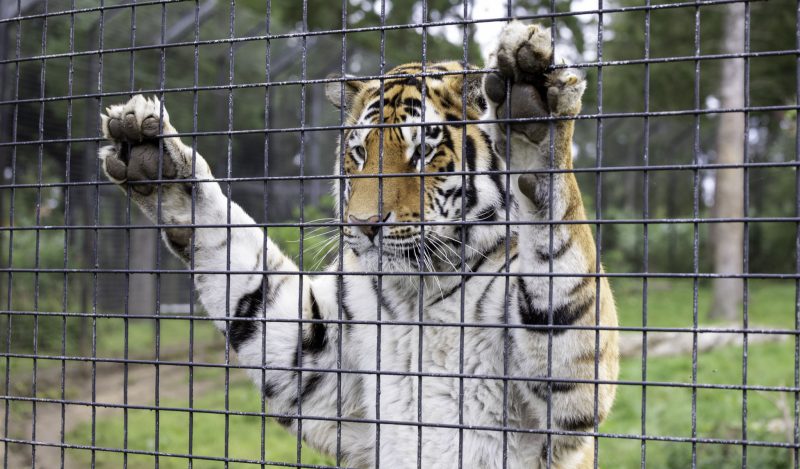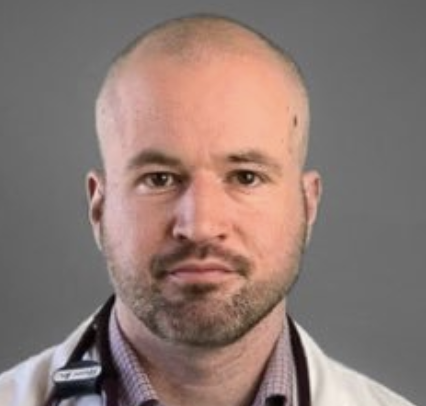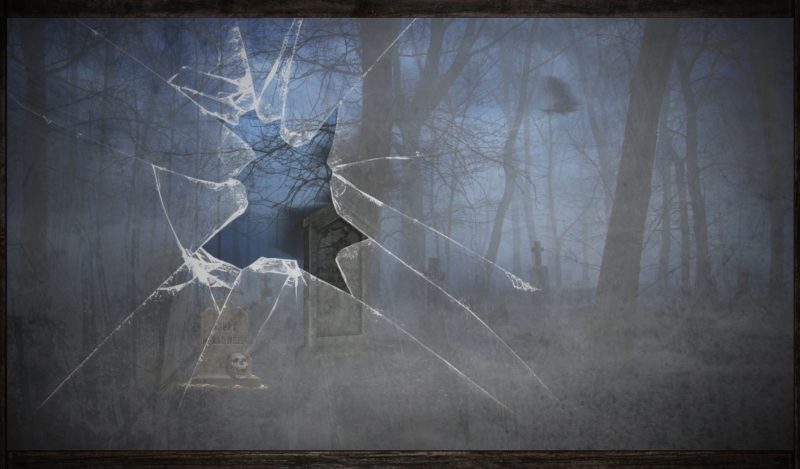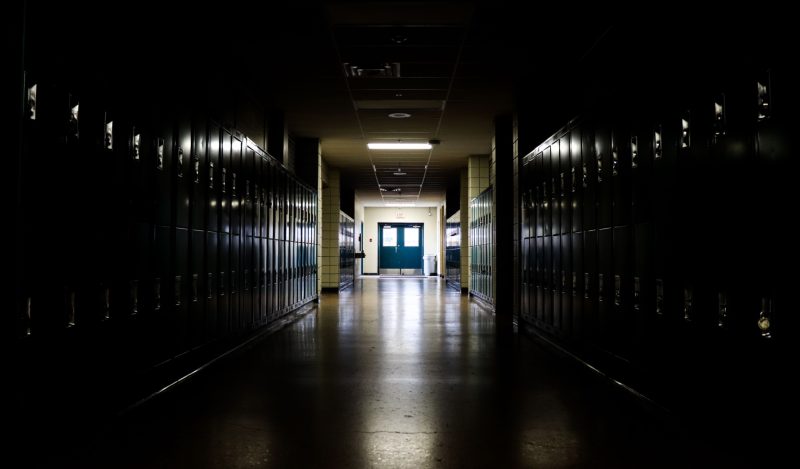This original essay series is my attempt to tell my story. I was suppressed because of the widespread ideological possession among those in power. This pernicious problem stretches far beyond my life.
Note to readers: we are proud to release the first part of an exclusive essay series by Kevin Bass on his suspension from medical school. It shines a bright light on the dark, repressive forces driving academia, ideological groupthink, cancel culture, and Covid extremism. Through Kevin’s own telling of his heartbreaking story, we hope to take you on a poignant journey over the coming weeks into the heart of pandemic failure and the accompanying political and social collapse. Support Kevin by becoming a paid member at his Substack here.
Jay Bhattacharya and Rav Arora
A Visit to the Pharmacy Without the Police
I hit the dial button. A voice emerges from the void on the other end, “Texas Tech Police Department. Smith speaking.” I go through my response – a script – a self-conscious constantly repeating ritual, “Hi. This is Kevin Bass. I have a criminal trespass warning, and I would like to visit the Texas Tech University Health Sciences Center Pharmacy to pick up my medication. Could you, uh, please help me with that?”
“Hold please,” I hear on the other end. A new officer speaks, “Franklin here. Yes, you can come, but please provide me with your phone number. Enter through the same door as always. Officer Corgic will accompany you.”
Earlier that year, I had repeatedly gone viral on Twitter (now “X”), through a Newsweek piece, and after going on Tucker Carlson. I said that the response to the pandemic had been systematically wrong, harmful, and unscientific. I apologized for having supported it. The resulting press scandalized the medical community, leading to an intense, viral campaign of harassment, both on and offline.
At the tail end of this, after two attempts to have me barred from campus for having allegedly made physical threats, a group of administrators working together at the School of Medicine finally succeeded, without due process and in violation of Texas law. They posted wanted-style fliers everywhere in the medical education building, which were circulated among the student body, stigmatizing me and my family. Then, by ramming through a hearing process that violated their own Student Handbook policies in more than a dozen additional places, they achieved my expulsion from the School of Medicine.
They declared victory and gloated to each other and to students in mass emails. Those who played pivotal roles in orchestrating events were announced to have been given handsome promotions. It was as if the administration wanted the rest of the students to know that they were not safe. All I could do was call the campus police so that I could be escorted to get my prescription.
I arrive and look everywhere, but there’s no police officer in sight. Nobody calls my phone. I chat and laugh with a kind, enthusiastic, devoutly religious man whom I have gotten to know over the past few years at the front desk. We talk about God. I go to the pharmacy and ask one of the pharmacy employees if my medication is ready. She says, “Boy are you controversial!” I blurt out, “What now, are the police after me?” She laughs, thinking I am joking. I am. Partly.
She shows me an article that someone had sent her: “An Open Letter to the TTUHSC Admin & Faculty: Regarding Your Newly Famous Student Kevin Bass.” It was a commentary written by a marketing professional in New York who accused me of being a Nazi.
“Oh that one,” I say, relieved. The post was vacuous, but some people who did not understand the field took it seriously. So I ask what she thinks of it. “Way over-the-top,” she says. “Unhinged, right?” I ask, equal parts curious, seeking reassurance, and wanting to conclude the conversation before I leave. “Oh yeah,” she answers. I breathe a sigh of relief.
I talk to the greeter at the front desk again. I enjoy talking with him and always do when I can. He tells me his own struggles and tells me that God has plans for me.
As I drive home, I reflect on why I had no police escort. I also had no police escort, no security, no body, backpack, or coat searches before or during my conduct hearing, either. When I removed my laptop from my backpack or placed it back inside, nobody watched me as I did so. Nobody even blinked. I remember my accusers looking me stonily in the eyes, calmly telling me that they knew that I was dangerous, blankly telling me that they were afraid of me.
Yet I always had police escorts every time I visited campus in the month before the hearing. What’s more, although I was given permission to go to the pharmacy, to the counseling center, to pick up and drop off my 3-year-old son dozens of times, I was never given permission to visit potential witnesses for the purposes of recruiting them to testify on my behalf. The police told me that if I tried to meet with favorable witnesses on campus, they would arrest me.
The suspension had not prevented an attack. It was the attack.
My public free expression had provoked a primordial psychological reaction. This reaction bears striking similarity to the establishment’s reaction to the pandemic itself. Threat was imagined, even fabricated, then amplified out of proportion to any credible evidence; dissent was silenced; the result was my dismissal on the one hand and untold destruction as harmful policies made a bad pandemic worse on the other. What the establishment did to me was a microcosm of what it did during the pandemic; it has the same fundamental cause. It is not an exaggeration to say that this has critical implications for the future of Western civilization.
My Wanted Poster
In early November, the administration had printed flyers with my photograph in the middle resembling Wanted Posters. They circulated these around campus.
A student took a photograph and circulated copies to the other students at the school:
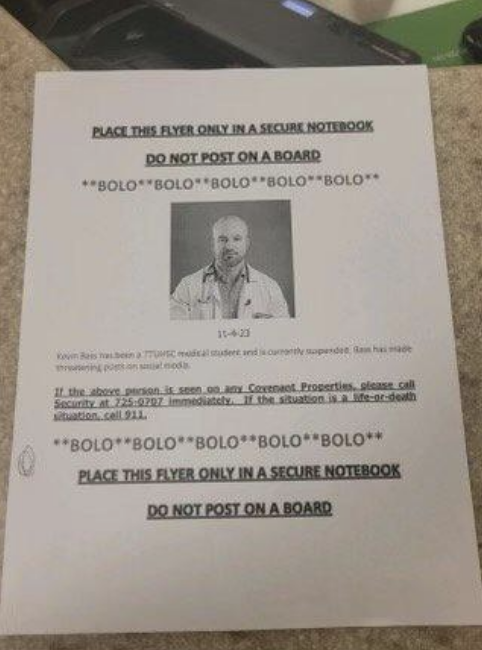
When I showed my ex-wife a copy of the poster, she broke down in tears. She asked, “Oh my God, who knows about this? Are people going to start treating me and the children differently?”
Rachel Forbes, my regional dean and one of several individuals who had orchestrated the suspension, sent out this email:
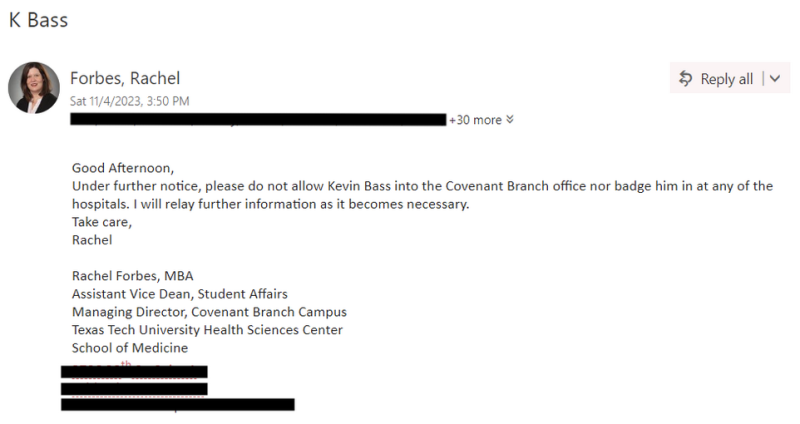
Students knew what had really happened. I received this text from one student through the grapevine:
Word on the street is that he tweeted something recently that could’ve been misconstrued as threatening and basically TTUHSC was looking for anything else they could use to validate kicking him out (even though they’ve wanted to for a long time apparently).
Canceled for a tweet. Here’s the one:
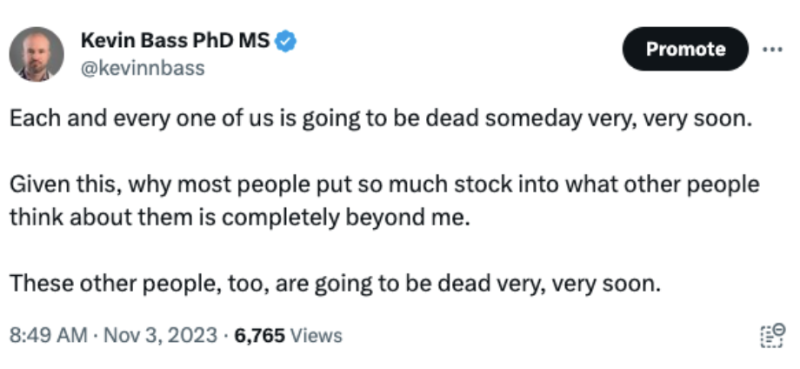
There was no hearing. No presentation of evidence. No cross-examination of witnesses. No credible appeal process. The so-called Threat Assessment Team meeting did not include any students or faculty who knew me well and who could interpret the tweet. One dean, Simon Williams, the one who had signed off on my suspension, met with me in person, without alarm, to discuss it.
I was kicked off campus, my medical studies suspended, and I was stigmatized in fliers and emails. We filed a lawsuit, but we could not get a temporary injunction in time to get me reinstated before TTUHSC could finish its work.
I fought them off several times in the previous six months using the due process protections provided by the Student Handbook. I won appeals when it was unusual for students to do so. I had multiple allegations retracted. One, like this one, was an allegation that I had threatened someone–indeed, threatened Rachel Forbes, a dean.
This time, however, Texas Tech was filled with an apparently desperate drive to get rid of me. They knew I would repel their attempt if they allowed me to defend myself. So they denied me a hearing, and they refused to provide me with the documents that they had lied in to make their decision. Only by breaking the law, bulldozing the Student Handbook, and lying were the administrators able to win.
The Ideological Fixation of the Pandemic Hysteria
The irony of all this was: I had been canceled by people whose views I had myself held a little more than just a single year earlier.
In 2019, I tweeted: “Health misinformation should be a criminal offense.”
Terry Maratos-Flier, a professor of medicine at Harvard who I knew through my scientific interest in nutrition and metabolism, replied: “Who decides what’s misinformation?” I shook my head, annoyed at what I knew was a dumb question. Was it not obvious to everyone what health misinformation was?
Then 2020 – and the pandemic – happened. Views like mine would soon be given life in ways I could never have imagined. The coronavirus may be novel, but the response is a very old and familiar story that has more to do with political science than with virology. Driven by hysteria and fueled by ideology, the world slipped into an authoritarian nightmare. The ruling elites responsible had a sterile and tenuous connection to ordinary existence mediated almost entirely by a phantasmagoric left-wing ideology. And this ideology was projected hysterically onto the virus and then violently onto humankind, justifying any and every policy, any and every lie.
(When I use the phrase “ruling class,” I am referring to what Barbara and John Ehrenreich called the professional-managerial class, consisting of roughly 20% of the population and including lawyers, media, artists, academics, scientists, journalists, administrators, bankers, tech professionals, etc.)
The media, the government, scientific and public health organizations, etc. relentlessly twisted the facts to conform to their ideology. Most of us were deceived into believing that Covid-19 was far worse than it really was, that interventions were more effective than they really were, and that downsides of interventions were smaller than they really were. The pandemic became cartoonishly distorted across every dimension. A psychic pandemic had been superimposed onto a real pandemic.
Public health elites did not worry that the messaging was wrong. They worried that the spell might be broken. Thus Birx lamented, “When people start to realize that 99% of us are going to be fine, it becomes more and more difficult [to get people to comply].”
Almost all pandemic policies sharply contradicted decades of scientific consensus. Most experts knew that this was wrong but were unwilling to fight the mob. But some did.
And public dissent by credible voices threatened to tear apart the fabric of false consensus. Government officials around the world sprung into action. They weaponized the concept of “misinformation” to systematically suppress dissent. The dissent later turned out to be true, while the consensus later turned out to be false across virtually all scientific questions.
The weaponization of the misinformation concept was supported by the media, by scientific institutions, and by Big Tech. All were united by a nearly universally shared ideology that has over the past two decades almost completely captured all professional institutions. This ideology enabled the organic and seamless coordination of all the thinking and communication about the pandemic. This achieved something far more powerful and terrifying than any conspiracy ever could – a mass formation that hypnotized almost the entirety of the ruling class and spread to the majority of the population.
Andrew Cuomo famously expressed the widely held ideation that distorted everything in its wake:
This is about saving lives and if everything we do saves just one life, I’ll be happy.
On the subject of lives, there could be no debate. Those killed by the virus were victims, and those whose “debate” might put these lives at risk were evil. Only grift, psychopathy, or delusion could motivate anyone to debate about the value of human life. This one, all-consuming idea subordinated science and led to widespread demonization of rational discussion. Thus, the response to the pandemic became primarily emotional rather than scientific. This reaction produced little benefit, may have caused more death in the long term and led to unprecedented loss of trust in science and legacy media. Childhood vaccine exemptions are now at a record level.
The ruling elite did not see themselves as ideological. They still don’t. They believed and believe that they hold an unfiltered view of the Truth. They see themselves as Hegel’s universal class, advocating for the interests of humanity. Dissent was thus experienced – and is still experienced – not just as disagreement but as immoral. Dissenters were thus removed from social media platforms, fired from positions at America’s prestigious academic departments and companies, and shunned by former peers and professional circles.
The most famous cases include Stanford professor Jay Bhattacharya, Stanford professor Scott Atlas, Levi’s executive Jennifer Sey, actor Clifton Duncan, Stanford professor Ram Duriseti, University of California Irvine professor Aaron Kheriaty, and countless others. When speech was not being censored, mandates made on the basis of dubious scientific rationale that later proved false created compliance tests that purged still others. The healthcare system has still to this day not recovered from the staffing shortage.
Because the social penalties for dissent were excessively steep, American society was unable to correct the widespread misrepresentations propagated by the professional elite. Science and policy became the passive tools of ideology. A blizzard of untruths buried civil society, freezing it, and leaving it defenseless to the consequences of unquestioned and unquestionable decision-making. This was symbolically represented by one extraordinarily talented chameleon of a man who declared, “I represent science.” All who might sound the alarm were frozen in place, mouths wide open as if in a scream, but unable to utter a word that might be heard over the shrieking, demonizing mob.
I celebrated all of it. In 2020 and 2021, as with many others, my mind and soul were consumed by the same black ideological phantasmagoria that has consumed so many others – that continues to consume doctors, scientists, and other professionals to the present day. I advocated for authoritarian policies to deplatform critics. I felt silent rage when I passed people in the real world who were not wearing masks. I zealously supported vaccine mandates.
And, like Deborah Birx, I had wanted lockdowns to be enforced in America as they were enforced in Italy and China, even if that meant welding people into their apartments. I thought free speech was an antiquated concept, exploited by misinformation super-spreaders for nefarious ends. I thought I was trying to save lives, and I thought that justified anything, no matter how vile.
I was so wrong.
And the people who canceled me just a couple of years later: they were me doing exactly what I had tried to do to others just a few years ago.
When the Snakes Slither Too Loudly
When someone believes that they are in possession of an absolute moral truth – when they are certain that they are right and their opponent is wrong, and when they are convinced that the stakes couldn’t be higher – a seductive view often emerges that the ends justify the means. Ethics are discarded. Lies, slander, threats of violence – all become morally permissible, even obligatory. At TTUHSC, this led to some truly sickening behavior.
When I returned to medical school from my PhD, I went from not having been subjected to a single formal disciplinary action from middle school through my PhD to nearly twenty formal reports or complaints within 6 months. I remember attending lectures and group activities and seeing and hearing other students and faculty do and say in front of everyone else things that would have gotten me immediately thrown into the proverbial Gulag, if not publicly whipped. From day 1, special rules applied to me and me alone. Whatever we call it, The Establishment, The System, The Matrix – it was reacting and trying to purge me, just as it has purged countless others. I saw the snakes spill out through the cracks as soon as they opened.
I fought back and wrote mistreatment reports about faculty members in response to their harassment. I had the support of several deans in doing so. Yet after concealing their so-called Threat Assessment Questionnaire, they finally provided it to me when it was already too late. I was shocked to find that TTUHSC had cited these very same mistreatment reports to suggest that my tweet was a threat.
How can a student filing mistreatment reports be considered evidentiary grounds for suspension? If this was legitimate grounds for my suspension, would that not be tantamount to saying that a student is forbidden to express concern that a faculty member or group of faculty members is targeting them, lest they have new false accusations levied against them?
As in a Franz Kafka novel, when I complained about faculty abuse, administrators claimed that my protests were acts of aggression. Jennifer Freyd calls this technique DARVO: Deny, Attack, and Reverse Victim and Offender. What TTUHSC did was DARVO at the institutional level.
It gets worse. In the Threat Assessment Team’s explanations, administrators claimed that I had in emails expressed frustration with the initial investigations. They cited this supposed “frustration” as evidence that my tweet was threatening. Not only was this ridiculous, it was not true. Over emails, I had expressed enthusiasm for the outcome of these investigations because they vindicated my claims. The hearings that would have resulted from these and other findings would have led to devastating consequences to those who were abusing me. Yet in the Questionnaire, the administrators lied and claimed the opposite to justify the suspension, thereby bypassing the hearings.
Why I am Writing
This essay series is my attempt to tell my story. I was treated viciously because I was communicating something of value to the public. I was suppressed because of the widespread ideological possession among those in power. I tell this story because this is a problem that impacts everyone. Not a problem limited to Covid-19, a great silencing now permeates our universities and professional institutions throughout the West. It covers ever-growing swathes of human knowledge. In doing so, it creates widespread dysfunctions in all the social and political institutions of the West.
My story is a story so dark that many will not believe it. Others, in an attempt to heal the tearing fabric of their sense of reality, will assert that I must have deserved what happened. I won’t blame them for that. Accepting the truth of what has happened to our society is identity-shattering. It was for me. I have concluded what many still refuse to conclude: we are not merely on the precipice of dystopia; we have arrived; it is not merely a threat; it has already fully engulfed us. My goal is to persuade you, dear reader, of that sad fact. But that dystopia can become brighter, and we can escape. It can also grow darker, too, and we can sink deeper into those black depths in our rudderless, flooding boat. It is up to us.
The West is confronted with a grave existential threat, caused by people who are committing evil deeds, day in and out, passionately convinced that they commit them in the name of good. The consequences of all of this will be catastrophic if we do not change course. People must grasp this evil before it is too late.
Republished from The Illusion of Consensus
Published under a Creative Commons Attribution 4.0 International License
For reprints, please set the canonical link back to the original Brownstone Institute Article and Author.
